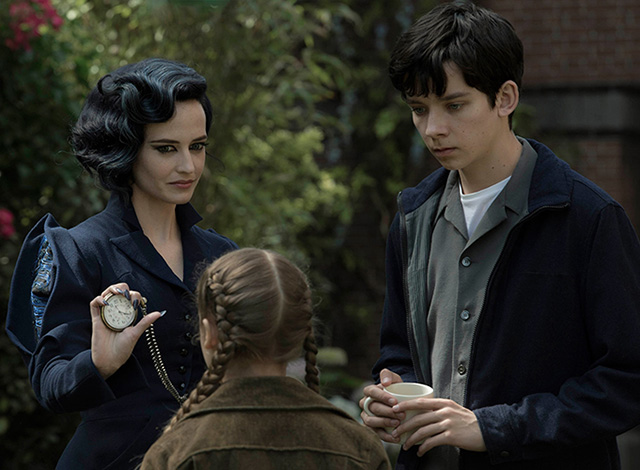Miss Peregrine’s Home Has Some Structural Damage

Movies based on widely-read books can be tricky. Will it be true to the story? Will the characters look and sound like they do in your mind? Will the movie be good on its own merits?
In the case of Miss Peregrine’s Home for Peculiar Children, Tim Burton’s adaptation of the wildly popular series by Ransom Riggs, the answers are: partially; nope; mostly. Read on for a slightly spoilery review (mostly putting the scenes you’ve seen in trailers into context).
[divider]
Any plot that features temporal phenomena like time loops — a single day in time that repeats every 24 hours — will have a challenge simply making sense. Add in several complex backstories and side plots involving Nazis, and the script could easily be overstuffed. Burton and screenwriter Jane Goldman (Kick-Ass, X-Men: Days of Future Past) largely did a solid job of focusing on the central characters and story while writing out the book’s secondary characters and subplots.
American teen Jacob (Asa Butterfield, Ender’s Game) discovers that his grandfather’s wild stories about children with unusual powers might be true. After witnessing a traumatic event, Jake convinces his father, Franklin (Chris O’Dowd, The IT Crowd), that they should visit the island off the Welsh coast where his grandfather lived as a boy, promising that it will help Jake outgrow his grandfather’s tall tales.
Once there, he meets Emma (Ella Purnell, Kick-Ass 2). She leads him into a time loop, a single, repeating day in 1943 during the German bombing over England. She introduces him to Miss Peregrine (Eva Green, Dark Shadows), and to the children — known as Peculiars for their odd assortment of magical powers — she protects in her Victorian mansion. He learns more about about this hidden world of time loops and peculiars, monstrous Hollogasts and wights, and his grandfather’s history with Miss Peregrine’s home. Before long, Jake is thrust into the fight against a nefarious group bent on capturing Miss Peregrine and controlling time, and has to chose between life in the loop or in real time with his family.
Burton does a solid job of introducing this peculiar world. It’s atmospheric and foreboding, all pale greys and washed-out blues, with tantalizing glimpses of horrific monsters. He tells the story of a gawky teen, raised on his grandfather’s stories of almost-but-not-quite plausible adventure, wanting to experience those adventures himself, and eventually coming to grips with the reality of being peculiar himself.
Burtonisms take over
Not long after Jake enters the loop, however, Burton begins to forego subtlety. The palette changes to bright colors, full dancing skeletons and carnival sideshows. There are several shots seemingly lifted from other movies: Jake and Emma looking into the sun on a ship’s bow is a flagrant example. The third act also abandons the book’s genuinely tense, white-knuckle chases in favor of big set pieces and generic storylines. The result is uneven, alternating between frenetic and flat.
The entire sunken ship sequence is cartoonishly absurd, children suddenly using their powers out of proportion to anything seen or hinted at previously, and suspension of disbelief goes out the porthole. Later, their powers are tame and insufficient. In another scene, fraught with real menace and threat, the Hollogasts are gruesome, implacable monstrosities. Shortly after that, they’re reduced to comic relief in an otherwise amusing scene that turns them into hapless boogeymen. The dread created by terrifying monsters bent on devouring children evaporates; the scene feels gimmicky and over-the-top and ultimately toothless.
It screams “Burton!”
A bigger problem is casting. Eva Green isn’t nearly British enough as Miss Peregrine, the quintessential English headmistress. She chews the scenery along with her pipe. She adopts a bird-like affectation and a sharp officiousness that reminds me of Jeremy Brett as Sherlock Holmes; the combination doesn’t quite work. Asa Butterfield looks the part, but he’s wooden and has little presence or charisma. Sam Jackson, in delightfully gruesome horror-show teeth and contacts, plays uber-baddie Barron with gleeful abandon, but he’s doing the same indelibly Sam Jackson character as nearly every other Sam Jackson character. The original General Zod, Terence Stamp, plays Jake’s grandfather; for a person who presents such a larger-than-life image to Jake, Stamp is too reserved, more Oxford than East End. Chris O’Dowd is even worse; an Irish actor playing a native of Florida with an oddly SoCal surfer accent, he vacillates between overprotective and indifferent as Jake’s dad.
Emma is awesome
One real bright spot is Ella Purnell. She inhabits Emma, breathing a natural charm, vitality and vulnerability into the character. She stands out in nearly every scene she’s in. Unfortunately, she’s turned into a plot device as Jake’s time-crossed love interest, his prize for staying in the loop with her and the peculiars.
So does it work as a movie if you’re not familiar with the books? For the most part.
The solid first half goes a long way. The second half is uneven, full of limp set pieces, hyperbolic acting, and pat resolutions, but it’s mostly entertaining. Its familiar beats and effects-centric visuals will amuse casual fans and anyone content with standard Hollywood blockbusters.
That said, I keep wondering who this movie is aimed at. Hardcore fans of the books will love the first half but will almost certainly be upset with the completely fabricated third act. Jake and Emma shippers will probably be disappointed by the lack of chemistry in the teens’ will-they-won’t-they story. It’s PG-13, so it isn’t for little kids; and rightly so, as the Hollogasts are seriously scary at times. Will it appeal to a YA crowd that doesn’t know the books, or to anyone outside the tween market? Time will tell, but it feels like a missed opportunity.
Miss Peregrine’s Home for Peculiar Children (Twentieth Century Fox, PG-13): B-



